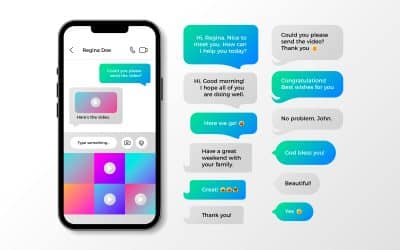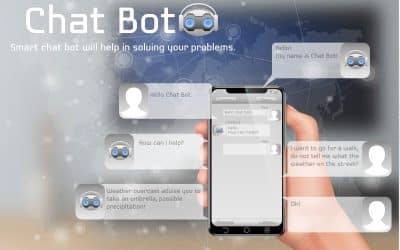Artificial intelligence in healthcare is growing and playing primary functions. It ranges from automating tedious and routine medical practices to directing medical and patient resources. While developers build AI tools to perform this task, numerous issues and risks emerge, such as the possibility of patient injury due to AI system mistakes, the potential risk to patients’ data collection security, AI inference, and many more. The possible AI Healthcare Software Development Solutions include investments in infrastructure that will provide accurate, high-quality data. Also a shared oversight process between the Food and Drug Administration and other healthcare providers. Also, modifications to medical education help prepare healthcare providers for the changing role in a changing system.
In this piece, we discuss both the possibilities AI offers to improve healthcare efficiency and the challenges to its swift implementation.
What Is AI In Healthcare?
AI in healthcare is a general term that uses machine learning (ML) algorithms and other cognitive technologies within medical environments. The simplest definition of AI is that AI refers to the process by which computers and other devices mimic human mental abilities and can be capable of understanding, thinking, and taking decisions or actions. AI is used in healthcare. It involves using technology to analyze and take action on data from medical studies, typically to anticipate a specific outcome.
An important AI usage case for healthcare is using ML, as well as other disciplines of cognition, to assist in diagnosing medical conditions. By analyzing patient and other data, AI can help doctors and medical professionals provide better diagnostics and treatment strategies. In addition, AI can help make healthcare more efficient and proactive by analyzing big data for improved preventive health suggestions for patients.
Why Does AI In Healthcare Matter?
Healthcare is among the most vital sectors of the larger picture of big data due to its essential role in building an efficient, flourishing society. Utilizing AI for healthcare data could be the difference between life and death. AI assists nurses, doctors, and other health professionals with daily tasks. AI is a critical component of healthcare. It can improve health prevention, enhance quality of life, provide better diagnosis and treatment plans, and improve patient health outcomes.
AI can also help predict and follow disease progression by analyzing data from government agencies, healthcare, and other sources. This means that AI could play an essential part in the global health system to battle outbreaks and pandemics.
Benefits Of AI In Healthcare
While the field is new, AI has the potential to be a significant part of the Healthcare SaaS system. The human body is constantly being challenged. The most popular use of medical AI is that it can do things that humans, even excellent ones, still need to accomplish.
Excellence In Medical Research And Education
AI can also share specialists’ knowledge and skills to aid providers with more expertise. Radiology and ophthalmology are both popular subjects, mainly since AI methods for image analysis have been at the forefront of research and development. Many programs utilize photographs of the eyes of humans to diagnose conditions that might require the expertise of an eye doctor. Technicians, general practitioners, or patients may arrive at that conclusion with these software programs. This is because specialists, specifically experts with high-level expertise, have fewer clients than their needs across many different areas.
The Routine Gathering Of Information
Generative AI will improve reporting and information-gathering efficacy by communicating with patients using understandable conversational language, eliminating uncertainties, and presenting data to healthcare professionals. AI technology can aid health professionals in gathering their patients’ medical history by asking specific questions in a friendly way. A further benefit of AI is its ability to access healthcare information exchanges (HIEs) to access medical records for patients, examine the information, and ask appropriate questions about their medical history.
By crossing references between a patient’s list of medications and their current health conditions, AI can verify whether patients adhere to their regimens prescribed by doctors or have eliminated any other medicines that are in conflict in the light of recent prescriptions. This method aids in the creation of the most complete medical history of the patient. Physicians can use this information to offer better treatment.
Additionally, patients familiar with AI software in various environments may find adjusting and comfortable with similar AI technology in healthcare more straightforward. The jobs these AI systems perform tend to be routine and have the least risk, which aligns with the current capabilities of artificial intelligence technology. These systems are proficient in handling such processes and deliver at a rate generally considered adequate in this field.
The Automation Of Drudgery Within Medical Practice
AI could automate computer-related jobs that comprise much of the medical field today. Doctors and nurses spend an enormous amount of time dealing with digital medical records, reviewing screens, or using keyboards in the examination room. AI devices can store important information from the patient’s records and later extract recordings of appointments and conversations into structured data. This would save doctors significant time and improve the interactions between the patient and provider and the overall quality of the healthcare encounter for both.
Diagnosis
AI is promising to improve diagnostic methods, mainly when there is a lot of available data. However, making exact diagnoses and eliminating the effects of biases remains a challenge, especially in cases of less well-known diseases that have restricted the data available. The effectiveness of AI in diagnosing rare illnesses is hindered due to the scarcity of data. The AI may need an adequate learning sample to perform effectively.
For common ailments, which have plenty of data, it is essential to ensure that AI platforms can access vast datasets to enhance their performance. This will avoid creating a balkanized AI world where healthcare systems with access to vast amounts of data owned by the Medical Software Development Company enhance their competitiveness over smaller counterparts. Current artificial intelligence (AI) models that are generative AI technology, including ChatGPT, use publicly accessible data.
In the absence of incorporating the extensive medical history that has been accumulated from numerous initiatives to digitize healthcare data, using general AI models to diagnose medical conditions is a risky move. Healthcare professionals are advised to be careful when using generative AI to help diagnose patients until they can develop the AI using large medical records databases.
While health providers have created their AI system on sufficient medical data sets, they must take care to minimize the risk of potential harm. It is essential to design a specific workflow that uses AI assists, not replacing physicians during diagnosing. AI is a valuable assistance rather than replacing.
The Management Of Patients And Medical Resources
Last but not least, AI can be used to allocate and shape businesses for the general public. AI systems might predict which departments will need more short-term staff. They also suggest which two patients would benefit the most from the limited medical resources available and, perhaps more controversially, find revenue-generating practices.
Population Health Management
By utilizing a wealth of data from Electronic health records (EHRs) and HIEs, physicians can significantly enhance the control of the patient population. It is possible to do this even better by integrating predictive analytics that utilizes AI to pinpoint the patients most at-risk who will significantly benefit from timely medical intervention. In particular, AI algorithms can be developed to evaluate the possibility of hospital readmissions after discharge using a variety of patient-specific characteristics. Based on these forecasts, custom patient health plans can be created by involving a human to ensure that patients get the proper care to avoid the recurrence of serious medical issues.
Although implementing AI programs may seem straightforward at first glance, realizing that their efficiency depends on access to vast and varied data sources is essential. More information than what’s typically recorded in EHRs and HIEs, such as the patient’s habits and actions, impacts their health outcomes.
To improve the effectiveness of the predictive AI models used for healthcare management, it is crucial to ensure that AI algorithms access and examine significantly more extensive and diverse databases. It is possible to achieve this by integrating data collected from wearable technology and smart devices. They can collect and monitor various health information and provide an improved picture of a person’s health history. Integrating these data can provide more accurate forecasts and, as a result, better intervention strategies that are more efficient, allowing for an improved and more personalized method of health care.
Challenges And Risks Of AI In healthcare
Although AI provides a variety of potential advantages, there are also several possible risks.
Errors, Injuries, And Accidents
The most significant risk is the risk that AI systems can sometimes make mistakes, and the patient may be injured or have other health issues could result. When the AI algorithm recommends the incorrect drug for a patient, fails to detect the presence of a tumor in an imaging scan, or assigns a hospital room to one patient over another. It is wrong to predict which patient would benefit or suffer more hurt.
Naturally, many injuries result from errors in today’s medical care healthcare system without the intervention of AI. AI mistakes could be different due to at least two factors. The first is that patients and healthcare providers might react differently when they suffer injuries caused by the software than they do to human errors. If AI technologies become more popular, a fundamental issue within one AI system could cause the injuries of thousands of patients rather than the tiny quantity of people injured due to an individual provider’s mistake.
Inequality And Bias
There is a risk of the health care system’s biases and inequalities in AI. AI algorithms learn from the information they have taught and can take biases from it. AI systems will become less accurate if their data comes predominantly from academic medical centers; such systems would know less about. Therefore, treating patients from populations that do not frequent academic medical centers is less effective. Also, if the speech recognition software is used to translate encounter notes, this AI could perform less well if the person providing it is of one of the races or genders that are underrepresented in the training data.
Privacy issues
A different set of risks arises in the area of privacy. A requirement for large data sets provides developers with incentives to gather details from numerous patients. Patients may be worried about the possibility of violating their privacy. Litigations regarding data sharing between extensive healthcare systems and AI developers have been filed. AI may affect privacy differently. AI can discern private data concerning patients, even if it has never been provided with this data. (Indeed, that is usually the aim of AI in health care.)
For example, an AI machine could detect people with Parkinson’s disease from the movement of a mouse on a computer, even though the patient previously did not reveal the data to any other person (or didn’t know). People might think this violates their privacy, mainly if the AI system’s findings were accessible to a third party, for instance, banks or insurance firms.
Needs Human Surveillance
While AI is making progress in medical technology, human oversight is vital. For instance, robots operating on patients perform their tasks logically, unlike being empathetic. Doctors may be able to observe critical behaviors that assist in diagnosing or stopping problems with medical care.
AI has existed for the past few years and is continuing to develop. As the field develops, more interactivity occurs between medical specialists and technology experts. AI needs human input and analysis to be used efficiently. As AI advances, technology and the medical field progressively cooperate to enhance the technology.
Inaccuracies Are Still Possible
Medical AI relies heavily on diagnostic data gleaned from various instances. When little information is available about specific diseases, such as demographics or the environment, mistakes in diagnosis are very likely. This can be particularly problematic when recommending a particular medicine. For prescriptions, information on particular populations and their responses to treatment may need to be included. This can cause problems in diagnosing and treating patients with specific demographics. AI is constantly evolving and improving to fill information gaps. However, knowing that some groups may need to be included in current domain expertise is crucial.
Possible Solutions For The Challenges
There are a variety of ways to manage the potential dangers of AI in healthcare:
The Generation Of Data, As Well As The Availability
Various risks arise from the challenge of gathering top-quality information in a way that is in line with the protection of privacy for patients. One possible solution is based on government-provided infrastructure resources to store data, which range from setting the standards for electronic health records to offering technical support directly to ensure high-quality data collection efforts within healthcare systems without these facilities. Another option is to make direct investments in creating high-quality data sets. Ensuring that privacy protections are adequate for large-scale data sets is vital to ensuring patients trust their data and participate.
Engagement Of Providers And The Education
Introducing AI in the healthcare system will undoubtedly alter the healthcare providers’ role. One optimistic expectation is that healthcare providers can provide higher-quality, more personalized care. And be able to communicate with patients in the same way as humans. An unfavorable vision could have providers fighting the unpredictability of forecasts and suggestions from rival algorithms. Whatever the outcome or the event of a middle ground, medical training will be required to train medical professionals. Because they need to assess and evaluate the AI technology they’ll be confronted with in the ever-changing healthcare setting.
Potential And Future Of AI Within The Healthcare System
AI offers opportunities to decrease human errors, aid medical personnel and doctors, and provide services to patients at all hours of the day. As AI technology improves, AI can now read medical images such as X-rays or scans, identify health concerns, and recommend possible treatment plans.
AI tools will continue to streamline various duties, including answering calls and studying trends in the population’s health (and most likely applications that still need to be contemplated). As an example, the following AI tools could automate or enhance the tasks of doctors and staff members. Humans will have more time and attention to provide caring in-person professional services.
In Summary
AI is undoubtedly a great tool to enhance the efficiency of the healthcare system. Automating repetitive tasks may help clinicians have more time so that they can allow more significant interactions with patients. Improved accessibility to data aids healthcare professionals in taking appropriate steps to avoid illnesses. Real-time information can help diagnose illnesses faster. AI Custom Healthcare Software Development is being utilized to cut down on administrative mistakes and help save precious funds. Small and medium-sized enterprises are becoming more engaged in AI creation, making the technology more practical and well-informed.
AI is becoming more widely applied to health care, but its limitations and challenges are being resolved and overcome. AI still requires some human surveillance, may exclude social variables, experiences gaps in population information, and is susceptible to increasingly calculated cyberattacks.
To minimize the dangers and challenges of AI for healthcare, healthcare providers must continue taking the usual steps to protect the privacy and security of patient data. They should conduct risk assessments to identify their specific risks and address them through implementing robust security measures like multi-factor authentication and encryption. In addition, healthcare providers should have clear guidelines that govern data gathering and usage from patients to ensure that they’re not infringing on patient privacy.
Despite some challenges and restrictions AI has to overcome, this revolutionary technology is expected to bring immense advantages to medical professionals. Whether a doctor or a patient, AI improves living conditions worldwide.











